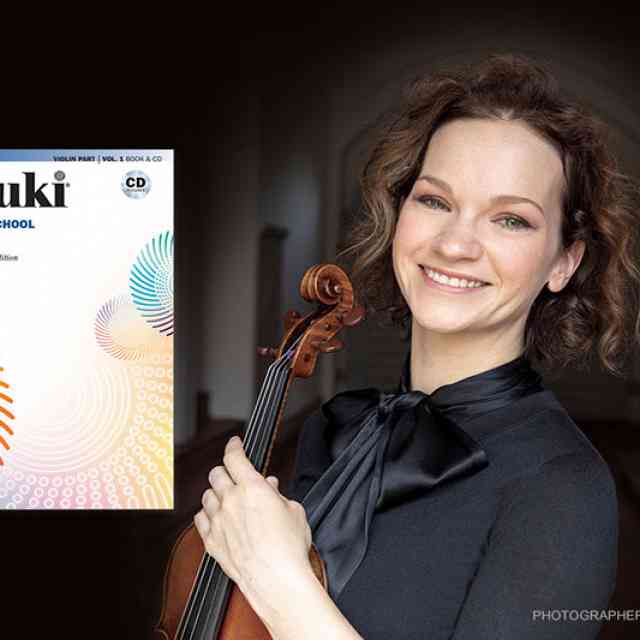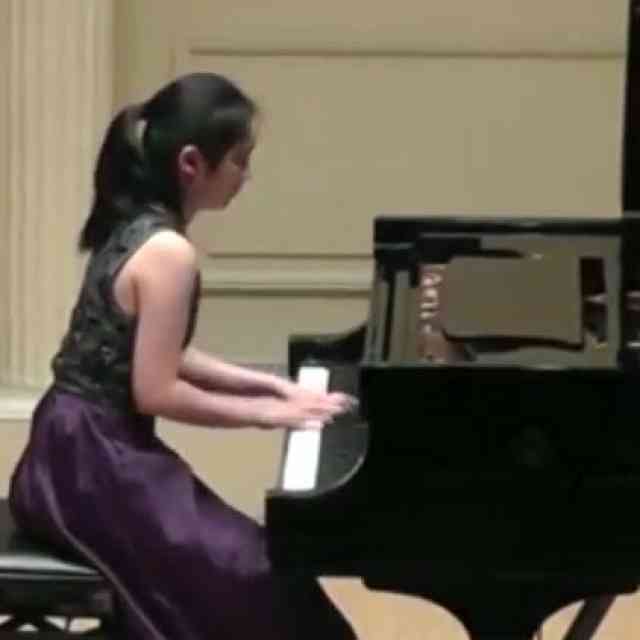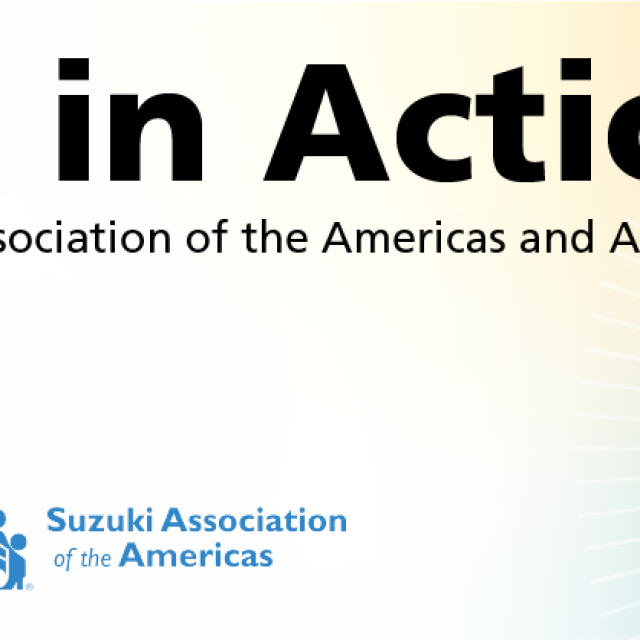What a joy to get to the end of concerts, recitals, rehearsals or lessons and receive smiles, hugs and kind words from students, families, and colleagues, all for experiencing unique and happy moments that we all did not want to end.
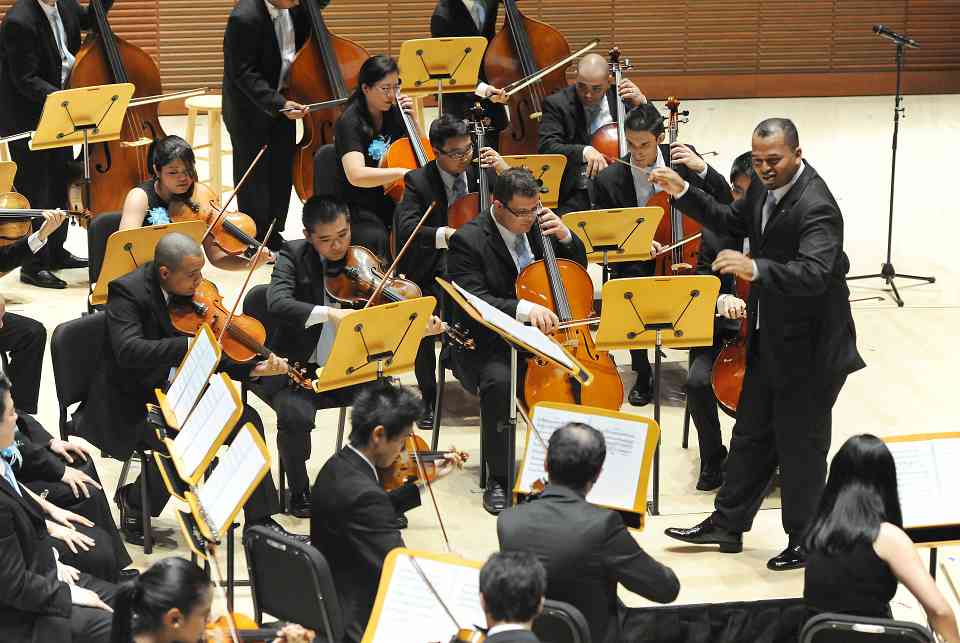
Alexandre Pinto
“Is it over? It was so quick today!”
“Mr. Alexandre, I can really see myself in you.”
These are typical phrases that I hear at the end of many of these meetings, before the pandemic and now in online lessons.
I am Alexandre Pinto, viola teacher at the Instituto Baccarelli (IB) group instruction program, a project that has the Suzuki philosophy and methodology as its reference, and music teaching through abilities and priority teaching as our guide. We learned these concepts with SAA Teacher Trainer Edward Kreitman during his training events offered here in Brazil.
In addition to being a viola teacher, I am also the conductor for the Heliopolis Children and Preparatory Orchestras in this same program. In the last four years I have witnessed big transformations involving entire families as a result of the Suzuki program implemented by violin teacher José Márcio Galvão, group instruction coordinator at IB.
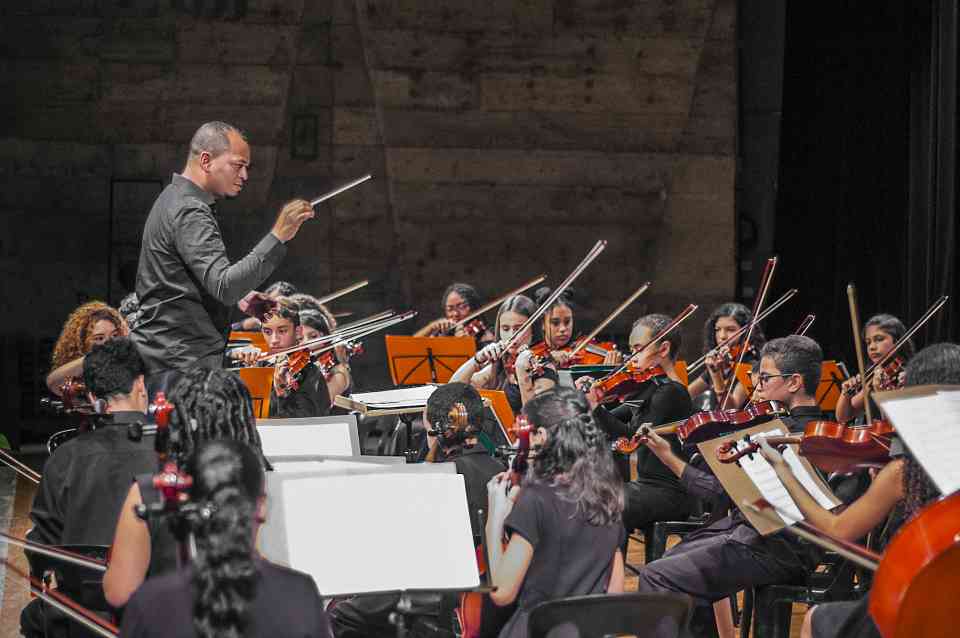
Alexandre Pinto
When I was invited to work at the institute as a teacher and as a “Suzuki conductor,” I felt very happy and flattered by the opportunity to be part of such an inspiring institution that has been transforming and “changing the life of children and young adults in the Heliopolis community, through developing a sociocultural project that has as its main mission social change through music.[1] The seed for this project came from “Maestro Silvio Baccarelli, whose when seeing disastrous images of a massive fire in the Heliopolis community, was touched and decide to help in any way possible.”[2] With music as a transformational tool, the institute has embraced the community, creating new paths and giving new opportunities to thousands of children and youth. A lot of these young adults are now part of spaces that were before considered to be unthinkable, either in the big Brazilian and world orchestras, or as valuable citizens in society.
What was the reason fo my happiness? In fact, there were many reasons, such as the ones I mentioned before, although unmistakably, it was because I could directly relate to the stories of my students and their families, especially the ones that were about their racial and socioeconomic issues.
I am Black, born in poverty in the inner-city region of São Paulo. Throughout my student years and my professional career, I felt in my own skin how hard and long was the path to achieve many of my goals. Although, it was not until I was an adult that I fully understood and felt how the racial and ethnic aspects were—and still are—one of the elements that requires much more strength, persistence, and fight from us—and not as much from those who are not Black.
During my music student years, there were no social projects or institutions that were open for beginners. I only knew about religious organizations that supported music as a group activity, where the older members taught the younger, with music being a way to serve the community and to give cultural and musical opportunities. It was then, through the Buddhist Association Soka Gakkai, that I had my first experience with music and immediately fell in love. I decided at that moment that I wanted to be a musician.
When talking to some of my friends at that time, many of them would ridicule me arguing that being a musician—especially playing instruments considered classical music instruments such as the violin or viola—was meant to be rich peoples’ profession, and in my case, it could only work if I played cavaquinho or pandeiro, instruments used to play Brazilian samba. After all, “it is in Black peoples’ blood.” I followed my own path, however, with my mother’s and the Soka Gakkai’s support.
I could take this opportunity to tell here hundreds of stories of my life as a student, musician, conductor and music teacher. In most of them, I was the only one or one of the few Black people in places like the public University I attended (Unesp) youth and professional orchestras I was part of, or in important concert halls where I performed. Either on stage on in the audience, I lost count of how many times I was subjected to discriminatory looks. But this time, I will focus on the general facts.
After more than 20 years, I realize that there is still much room for improvement. Structural racism is instilled in our society. Some concrete actions have been happening, however, such as the role of the Instituto Baccarelli in the center of the Heliopolis community. It comforts me to be able to fulfill my duty as a human being and have the opportunity to contribute with the life transformation of children and adolescents with whom I can identify.
I can affirm that, although lessons have a group instruction structure, and parents attend only specific meetings in our classrooms, we still value the Suzuki Triangle. With the continued involvement of the families, the students, and the teachers, we develop the work as a team that leads towards the learning process. All of that is done in an environment that recognizes that “Every Child Can,” every child should be “Nurtured by Love,” and “Character first, ability second.”
Through an environment filled with the ideas mentioned above, I am happy to be able to apply all these concepts in my work with the Heliopolis Children and Preparatory Orchestra. Our work starts from the repertoire choices, which are based on the student’s acquired abilities, focused on the listening of the pieces and their preparation, followed by identifying notes and rhythms, posture, tone, intonation, and musicality. This is only possible because all the students that are part of the orchestras are also from the Programa Suzuki do Ensino Coletivo (Collective/Group Teaching–Suzuki Program), in which all teachers are registered with the Suzuki Association of the Americas, having received their training from various Teacher Trainers.
In our program, our faculty is part of an environment that fosters collaboration rather than competition. Our experiences are shared with one another either informally—when a colleague observes a class—or in faculty meetings.
It is remarkable that several of our teachers and interns are graduates from the first classes in the institute, and themselves have been through many socioeconomics and racial hardships. They have grown to be excellent professionals with incredible results. This is the case of Marcos Mota, a dear colleague and friend, a cello instructor and coach for the orchestras, who has had his life transformed by music and by the Suzuki philosophy in his professional life and as a human being.
I was born and raised in the Heliopolis favela, and had my first contact with music at age 10. At the beginning I followed my street friends, but with time I started to fall in love with music. I could not begin to imagine that through cello and living in that environment, I would come to have incredible life experiences, traveling to different countries, playing with renowned artists and so much more.**
The institute awakened in me the desire to one day become a teacher. Since understanding more deeply the Suzuki philosophy and methodology through training, something settled in me, especially with the phrase that has never left my mind since the moment I heard it for the first time: ‘Every Child Can.’ With that in my heart, I decided that I could share my story with each child and family and inspire them that yes, ‘Every Child Can.’” **
– Marcos Mota, cellist, Suzuki cello teacher and assistant at the Heliopolis Children and Preparatory Orchestra.
It is quite fascinating to hear the story of this wonderful colleague, especially because I know of his fight, as a young Black man from the inner-city neighborhood, to reach new heights. This is something that I deeply identify with!
There are several of these same stories from my colleagues, who also had life transformations with music, especially after being in touch with the Suzuki philosophy. I will not be able to share all of these stories at this time, but I will share the story of Nicole Martins, a Black woman, violist, and teaching assistant at the Heliopolis Children and Preparatory orchestra who has been doing incredible work aligned with Suzuki pedagogy:
“As a student and violist at the Heliopolis Symphony, I had my first experience with the Suzuki philosophy, through the Suzuki trainings offered by the institute with the teacher trainer Shinobu Saito.**
At the time, I took the training because I am interested in learning and embracing new opportunities. I have to confess that it was not my intention to become a teacher, since I was always aware of the responsibilities that this would entail. After taking the Filosofia course, I had a new outlook. **
When I initially applied the philosophy to my own life, whether in my studies and practice, or in the way I saw the world, saw people, recognizing that ‘Every Child Can’ inside the Talent Education, I became interested in the possibility of teaching. Today, I have the opportunity to apply it in practice, in the assistantship and lessons at the Heliopolis Children and Youth Orchestras, a lot of the philosophy.
With the philosophy, I was able to get to know myself better. I live it daily and know that it will stay with me my entire life.”
– Nicole Martins, student and violist at the Heliopolis Symphony and intern with the Heliopolis Children and Preparatory Orchestras
I am thankful for the opportunity to share a little bit of this journey, mine and my colleagues’, who like me, are walking proudly with a happy heart, hopeful for a fairer, more peaceful, and happier world.
Last, as cliché it may sound, as I have continued in this journey, despite the lack of equity and structural racism, I keep succeeding and giving my best. All lives matter to me, but I loudly roar—yes, Black lives matter!
With appreciation!
[1]. https://www.bsocial.com.br/causa/instituto-baccarelli
[2]. https://www.bsocial.com.br/causa/instituto-baccarelli
VIDAS NEGRAS E SUAS TRAGETÓRIAS COM A FILOSOFIA SUZUKI EM SUAS PRÁTICAS
Que alegria poder chegar ao final de um Concerto, Recital, ensaios, ou aulas e poder receber sorrisos, abraços e palavras calorosas de alunos, alunas, famílias e colegas por ter vivido aquele momento feliz e único que não gostaríamos que acabasse tão cedo.
“Mas já acabou professor? Foi tão rápido hoje!”
“Professor, me identifico muito com o senhor.”
Essas são frases típicas que ouvi ao final de muitos desses encontros antes da Pandemia e agora nas aulas online.
Sou Alexandre Pinto, professor de viola do programa de aulas coletivas do Instituto Baccarelli (IB), projeto que tem a Filosofia e a Metodologia Suzuki como norte, e o Ensino por Habilidades e as Prioridades de Ensino da música como guias. Aprendemos esses conceitos com o professor Edward Kreitman em seus cursos de treinamento oferecidos aqui no Brasil.
Além disso, atuo como regente das Orquestras Heliópolis Infantil e Preparatória que fazem parte do mesmo Programa do Instituto. Ao longo dos últimos 4 anos tenho vivenciado grandes transformações envolvendo famílias inteiras, resultados do Programa Suzuki implementado pelo professor José Márcio Galvão, coordenador do programa de aulas coletivas do IB.
Quando fui convidado a trabalhar no Instituto como professor e “regente Suzuki”, me senti feliz e lisonjeado pela oportunidade de fazer parte de uma Instituição inspiradora. Inclusive, por sua história de transformação “vem modificando a vida de crianças e jovens da comunidade de Heliópolis, a partir do desenvolvimento de um projeto sociocultural que tem como principal missão a transformação social por meio da música”[1] A semente de tudo isso, partiu do “maestro Silvio Baccarelli que, ao ver as imagens dos estragos causados por um incêndio de grandes proporções em Heliópolis, se sensibilizou e decidiu que deveria ajudar de alguma forma.”[2] Assim, tendo a música como instrumento de transformação, o Instituto tem abraçado a comunidade e vem criando novos caminhos e gerando oportunidades para milhares de crianças e jovens. Muitos desses jovens ocupam espaços considerados impensáveis, seja na área da música nas grandes orquestras no Brasil e no mundo, seja como valorosos cidadãos e cidadãs na sociedade.
Por que da minha alegria? São muitos motivos como os que citei acima. Sem dúvida por me identificar e rememorar as histórias de inúmeros alunos e alunas e suas famílias com relação as suas condições sócio econômicas e questões raciais.
Sou negro nascido na periferia de São Paulo em condições de pobreza. Ao longo de minha trajetória como estudante e profissional “senti na pele” o quanto foi difícil e longo o caminho para alcançar muitos dos meus objetivos. Mas, confesso que foi na vida adulta que compreendi e senti como a questão racial e étnica foi – e ainda é – um elemento que me exige muito mais esforço, persistência e luta, do que os não negros.
Na minha época de estudante de música, não havia projetos sociais ou instituições abertas para os iniciantes. Eu tinha apenas conhecimento de algumas Organizações religiosas que incentivavam a prática musical coletiva, onde os mais “veteranos” ensinavam os novatos para atender a sua comunidade ou oportunizar acesso à cultura musical. Foi através da Associação Budista da Soka Gakkai que tive meu primeiro contato com a música e me apaixonei. Decidi que seria músico.
Quando falava com alguns amigos, muitos me ridicularizavam dizendo que músico, principalmente de instrumentos considerados “de música clássica” como violino e viola, era profissão para ricos, e no meu caso, só poderia dar certo se fosse aprender cavaquinho ou pandeiro. Afinal “tá no sangue do negro”. Contudo, segui meu caminho com apoio especial da minha mãe e da Soka Gakkai.
Poderia contar aqui as centenas de histórias vividas na caminhada como estudante, músico, regente e professor de música. Nelas eu geralmente era o único ou um dos poucos negros nesses espaços, como na Universidade Pública – Unesp – onde estudei, nas Orquestras Jovens e Profissionais onde atuei, nas grandes salas de concerto onde toque. Seja no palco ou no público, perdi a conta de quantas vezes fui alvejado por olhares discriminatórios…. Mas dessa vez ficarei só nos fatos gerais.
Passados mais de 20 anos, observo que ainda há muito a melhorar. O racismo é estrutural e está incutido em nossa sociedade. Porém, algumas ações concretas estão acontecendo, tais como a atuação do Instituto Baccarelli no seio da comunidade Heliópolis. Ter a oportunidade de contribuir com a história de transformação de vida das crianças e adolescentes com as quais me identifico me traz alento por poder cumprir minha missão como ser humano.
Posso afirmar que, mesmo as aulas serem coletivas e de termos as mães, pais ou responsáveis apenas em encontros pontuais em nossas salas de aula, valorizamos a importância do “Triangulo Suzuki”. Pois com a participação da família, do aluno ou aluna e dos professores no processo de ensino, criamos um trabalho em equipe para essa caminhada de aprendizagem. Tudo isso em um ambiente que valoriza e reconhece que “Toda a Criança é Capaz”, que “Educação é Amor” e que “Caráter primeiro, habilidade depois”.
Dentro do ambiente e ideias citadas acima, tenho a alegria de poder aplicar livremente esses conceitos nas aulas com as Orquestras Infantil e Preparatória Heliópolis. Nosso trabalho se dá desde a escolha do repertório com base nas habilidades já adquiridas, na importância da escuta das peças e na própria preparação das mesmas, seguindo o processo de reconhecimento das notas e ritmos, postura, sonoridade, afinação e musicalidade. Isso porque todas e todos alunos dessas orquestras fazem parte do Programa Suzuki do ensino coletivo de cordas na qual seus professores são certificados pela Associação Suzuki das Américas (SAA), recebendo treinamento com diversos Professores Capacitadores.
Além disso, a equipe de professores Suzuki do programa atua em um “ambiente de colaboração, não competição”. As experiências são partilhadas, seja informalmente – quando um colega assiste a aula de outro –, ou em reuniões de equipe.
É incrível que muitos dos professores e monitores da equipe, são oriundos das primeiras turmas de alunos e alunas do instituto, que também passaram por inúmeros desafios sócio econômicos e racial. Hoje, eles atuam como excelentes profissionais, com resultados maravilhosos. É o caso de Marcos Mota, querido colega, amigo, professor de cello e monitor das Orquestras, que teve sua vida impactada pela música e pela a Filosofia Suzuki na sua prática profissional e como ser humano:
“Nascido e crescido na favela Heliópolis, tive meu primeiro contato com a música aos 10 anos de idade. No início fui porque meus colegas de rua foram, mas com o tempo fui me apaixonando pela música. Por meio do cello, mal imaginava que, vivendo naquele ambiente, eu teria as grandes experiências de vida conhecendo outros países do Mundo, tocando com artistas renomados e muito mais.
Foi o instituto que despertou dentro de mim o desejo de um dia me tornar professor, e ao conhecer a filosofia e metodologia por meio dos cursos e treinamento, algo se firmou em mim, especialmente com a frase que não sai da minha cabeça desde o momento que ouvi, “Toda Criança é Capaz”. Com isso em meu coração, decidi que poderia compartilhar minha história com cada criança e suas famílias, e sensibilizar mostrando que sim, “Toda Criança é Capaz”.
Marcos Mota, cellista professor Suzuki e monitor das Orquestras Heliópolis Infantil e Preparatória
É realmente maravilhosa a história desse nobre colega. Pois também sei das suas lutas como jovem negro da periferia, para alçar grandes voos. Algo que também me identifico muito!
São inúmeras histórias de colegas que trabalham comigo, que tiveram grandes transformações com a música, mas sobretudo a partir do contato com a Filosofia Suzuki. Não conseguirei compartilhar todas dessa vez, mas não poderia deixar de compartilhar o relato da professora Nicole Martins. Mulher negra, violista, e também monitora das Orquestras Heliópolis Infantil e Preparatória, realiza um trabalho incrível alinhada a pedagogia Suzuki:
“Como aluna e violista da Sinfônica Heliópolis, tive meu primeiro contato com a Filosofia Suzuki, pela oportunidade que o instituto ofereceu trazendo os treinamentos Suzuki com a professora Shinobu Saito.
Na época fiz porque sou uma pessoa que gosta de aprender e abraçar as oportunidades. Confesso que não era minha intenção atuar como professora, pois tinha a noção da responsabilidade que isso representa. Mas ao fazer o curso da filosofia Suzuki, um novo olhar se abriu.
Aplicando a filosofia inicialmente comigo mesma, seja em meus estudos, na maneira de ver o mundo, de enxergar o outro, reconhecendo que “Todos são Capazes” dentro da “educação do talento”, passei a me interessar pela possibilidade de dar aulas e hoje tenho a oportunidade de aplicar na prática muita da filosofia, na monitoria [e na] aula que faço nas Orquestras Heliópolis Infantil e Preparatória.
Com a filosofia passei a me conhecer melhor. Vivo isso em meu cotidiano e acredito que será para a vida inteira.”
Nicole Martins, aluna e violista da Sinfônica Heliópolis e Monitora das Orquestras Heliópolis Infantil e Preparatória
Agradeço a oportunidade de partilhar um pouco dessa jornada, seja minha ou de meus colegas, que como eu estamos caminhando com o coração feliz, de cabeça erguida e esperançoso por um mundo cada vez mais igualitário, pacífico e feliz.
Por fim, talvez soe um pouco clichê, mas nessa caminhada, mesmo com a falta de equidade e o racismo estrutural, sigo vencendo e oferecendo o meu melhor. Me importam todas as vidas, mas brado bem alto – VIDAS NEGRAS IMPORTAM SIM!
GRATIDÃO!
Alexandre Pinto
[1] https://www.bsocial.com.br/causa/instituto-baccarelli
[2] https://www.bsocial.com.br/causa/instituto-baccarelli
Bibliografia
Educação é amor, Shinichi Suzuki

